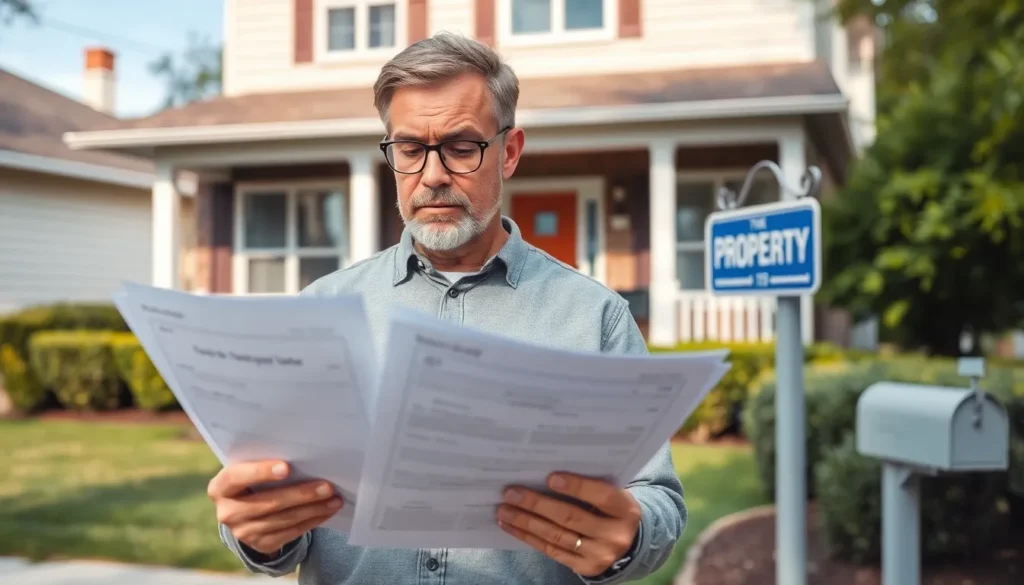Table of Contents
ToggleNavigating the world of property taxes can feel like trying to solve a Rubik’s Cube blindfolded, especially for couples filing separately. When it comes to claiming property taxes, the rules can be as tangled as a pair of earbuds in your pocket. Who gets the tax break? Is it the one who pays the bills or the one who insists on claiming the dog as a dependent?
Understanding Property Taxes
Property taxes represent a significant financial obligation for homeowners. When married couples file separately, determining who claims these taxes can become complicated. Various factors influence eligibility for deductions related to property taxes.
Typically, the individual who pays the property tax bill directly gains the deduction. In instances where one spouse pays the property taxes, clarity around the tax benefit remains essential. Filing status also impacts property tax deductions.
Each spouse may also claim deductions if both contribute to payments. If one spouse claims dependents, the other cannot automatically assume tax benefits for property taxes. Eligibility for deductions can vary based on state laws and tax regulations.
State regulations often dictate how property tax claims can be made. Some jurisdictions allow tax deductions based on income levels or filing status. Taxpayers should consult state-specific guidelines for accurate information.
Documentation of payments also plays a critical role. Keeping accurate records of tax payments simplifies the process when filing. Additionally, both spouses should communicate to ensure all applicable deductions are claimed properly.
Understanding these intricacies can help couples navigate their property tax obligations effectively. Awareness of tax liabilities and benefits enables informed decisions when managing finances during tax season.
Filing Status Overview

Couples filing separately face unique considerations regarding property taxes. Understanding these complexities is essential for accurate tax filing.
Married Filing Separately Explained
Married filing separately allows each spouse to report income and deductions individually. This status may provide benefits, especially for those with significant medical expenses or miscellaneous deductions. Each spouse retains the ability to claim personal exemptions independently. When property taxes are involved, the spouse directly paying the taxes can typically claim the corresponding deduction on their tax return. Additionally, state-specific laws impact eligibility for these deductions, making it vital to consult local regulations. Couples need to be aware that filing separately often alters the availability of certain tax credits and deductions.
Common Misconceptions
Misunderstandings around property tax deductions are widespread among couples filing separately. A common belief is that only the spouse whose name appears on the property title can claim deductions. In reality, any spouse contributing to property tax payments may be eligible to claim deductions. Another misconception revolves around the deductibility of property taxes, leading couples to incorrectly assume that only one spouse can benefit from the deduction. Clarifying these points can help prevent missed opportunities for tax savings. Spouses should also communicate openly about their contributions to avoid confusion during tax season.
Property Tax Deductions
Property tax deductions can lead to significant savings for married couples filing separately. Understanding who claims these deductions is crucial for tax planning.
Who Can Claim Property Taxes?
The spouse who directly pays the property tax bill typically claims the deduction. Contributing to the payment allows either spouse to potentially benefit, as long as both participate financially. State laws may also influence eligibility, creating variations across different regions. Misunderstandings often arise about ownership; the name on the title doesn’t solely determine who can claim. Open discussions between spouses foster a better understanding of how deductions apply.
Documentation Requirements
Proper documentation is essential for claiming property tax deductions. Keeping records like property tax bills, payment receipts, and any related forms ensures accuracy. Each spouse should retain copies of relevant documents to support their deductions. Tax forms specific to each state may also play a role, highlighting the importance of staying informed. Accurate documentation simplifies the tax filing process and helps avoid potential disputes or audits.
Impact on Tax Refunds
Tax refunds can vary significantly for couples filing separately, especially regarding property tax claims. Understanding the benefits and drawbacks of this filing status becomes essential for maximizing tax refunds.
Benefits and Drawbacks
Filing separately allows greater control over individual income and deductions. One spouse might benefit from itemized deductions while the other takes the standard deduction. Deductions for property taxes could increase refunds if both spouses contribute. Conversely, limitations exist, such as reduced eligibility for certain credits. Couples may miss out on tax incentives when filing separately, which can reduce overall refunds. The process requires clear communication to ensure both parties capitalize on available deductions. Staying organized with documentation supports better claims and reduces the chance of audits. Understanding state-specific regulations further impacts tax outcomes and opportunities.
State-Specific Regulations
State laws governing property tax deductions vary significantly. Each state has unique guidelines that dictate eligibility for claiming these deductions. Some states allow couples who file separately to combine their contributions, whereas others enforce stricter rules.
California, for example, permits married individuals to claim property tax deductions separately if both contributed to payments. In contrast, Texas mandates that the spouse whose name is on the property title should file for the deduction, regardless of who made the payments. Understanding these nuances is essential for effective tax planning.
Various states define residency differently. Some states require proof of residency to qualify for deductions, while others do not. If a couple resides in separate states, they should carefully review each state’s tax code for potential benefits or restrictions.
Documentation remains crucial across all states. Keeping detailed records of property tax payments helps substantiate claims during tax filing. In Florida, for instance, failure to provide proper documentation could result in denied deductions.
Tax credits may also differ by state. Some states offer tax credits specifically for property taxes, while others do not. Couples should be aware of local credit options, as these can enhance their overall tax situation.
Engaging with a tax professional familiar with state-specific regulations can provide tailored advice. Many couples benefit from professional insight to navigate complex tax environments. Ultimately, knowing the state-specific rules ensures married couples filing separately optimize their property tax claims effectively.
Navigating property tax claims when married filing separately can be challenging. Understanding who can claim these deductions is crucial for maximizing tax benefits. Typically, the spouse who pays the property tax directly is eligible for the deduction. However, both spouses can benefit if they contribute to the payments.
State-specific regulations play a significant role in determining eligibility, making it essential to stay informed about local laws. Proper documentation and clear communication between spouses are vital to ensure all deductions are claimed accurately. By being proactive and organized, couples can optimize their property tax claims and make informed decisions that positively impact their financial situation.







